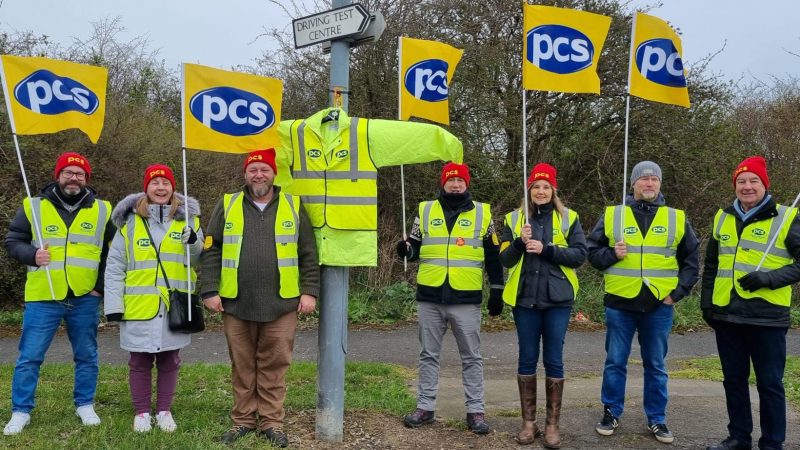'We've seen colleagues leave in droves' - why driving examiners are taking rolling strike action

This month, driving examiners across the UK are taking rolling regional strikes over 10 days, as members of the Public Commercial Services Union (PCS) escalate their industrial action.
Donna Wright, a Driving Examiner for 20 years, was on the picket line today with her colleagues across Northern England and Scotland who work for the Driver and Vehicle Standards Agency (DVSA).
Donna said driving examiners have gone from having a comfortable existence to feeling squeezed out of the public sector, and have now been ‘forced’ into taking action against poor pay.
“We’ve seen members’ salaries get to the point where there’s no room for extras and members who have used foodbanks for the very first time in their lives,” Donna told LFF.
“We have members from all walks of life and who came from other professions into the job. They cannot believe that they now feel forced into taking action because their pay is so poor.”
She said that a decline in salaries has led to a retention crisis in the industry as instructors and examiners are leaving on a huge scale to the private sector where pay is much better.
“We’ve seen colleagues leave in droves, there’s a much higher attrition rate than has ever been seen.”
As Branch Secretary for PCS Department of Travel in Scotland and Northern Ireland, Donna has also looked at the huge costs of this retention problem, which includes expenses from continued recruitment drives by the company, the training that’s involved and the time it takes away from managers and administrative staff, not to mention the loss of experience.
“How can you measure the cost of losing an experienced colleague. It’s very much a domino effect for everyone when people leave,” she added.
Those who remain in the public sector are working overtime to make extra money in order to pay their bills, said Donna, to the detriment of health and safety.
“We constantly caution members about the use of over-time and for people to recognise that their health and wellbeing comes first. But the majority of members are taking on more work to be able to afford a decent standard to live on and pay their bills, and if the hours are there.
“It’s another case of employers wanting people to work harder, longer and for less money.”
According to Donna, driving examiners historically don’t like to strike and generally ‘just get on with things’, however they’ve got to a point where even those with previous anti-union sentiment have joined the fight.
“We are all from different walks of life and some people have had no experience at all of unions or very anti-union experiences, I’ve heard all views.
“But these people still joined the union to be part of a collective and because they could see that was the only way they could have a voice in what’s happening.”
Formerly a driving instructor, Donna loves her job for the fact she can help future drivers manage their nerves and ensure safety on the roads.
“I can understand how nerve wracking it is for a candidate to take a driving test. It’s a particular kind of nervousness that doesn’t come with anything else. People go to pieces and I think it takes somebody who understands that to try and level that person off nerve wise so they can attempt to do their best in the time they have.
“There’s something special if you can do that and get them to be successful, it’s very rewarding.”
There was surprise on the picket line this morning as driving students un-expectantly turned up at the site to show their support for their instructors and examiners.
Donna said support from the public was ‘magnificent’ and heartening, adding that their fight, ‘is not with people, it’s with the government’.
“There’s a growing need for workers in the sector to stick together and try to make a difference to get a better deal.
“So we can stay where we are and not have to leave, because that’s the only option that’s really been left open to us.”
PCS, who represent civil servants and public sector workers, have called another all-out strike by 130,000 of their members on April 28.
They are calling for a pay rise of at least 10%, protection to pensions, job security and no cuts to redundancy pay.
Hannah Davenport is trade union reporter at Left Foot Forward
(Photo credit: PCS)
Left Foot Forward’s trade union reporting is supported by the Barry Amiel and Norman Melburn Trust

Left Foot Forward doesn't have the backing of big business or billionaires. We rely on the kind and generous support of ordinary people like you.
You can support hard-hitting journalism that holds the right to account, provides a forum for debate among progressives, and covers the stories the rest of the media ignore. Donate today.



